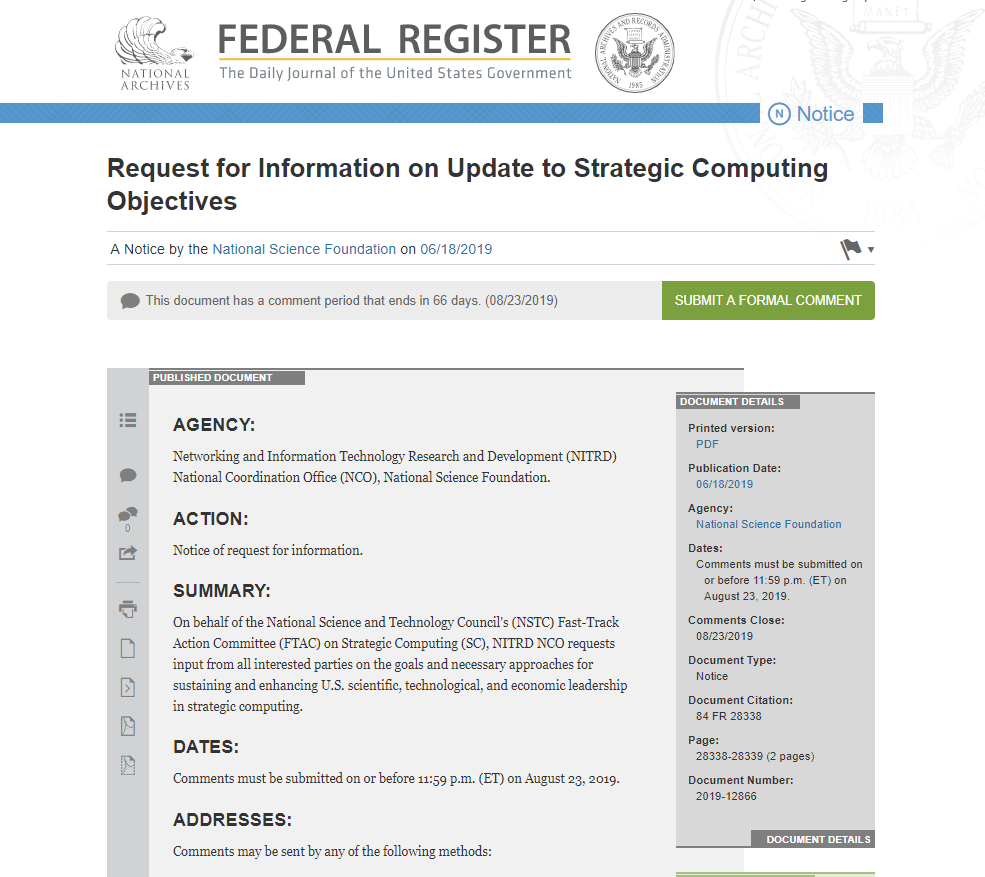Federal Register Notice: 84 FR 28338
AGENCY:
Networking and Information Technology Research and Development (NITRD) National Coordination Office (NCO), National Science Foundation.
ACTION:
Notice of request for information.
SUMMARY:
On behalf of the National Science and Technology Council’s (NSTC) Fast-Track Action Committee (FTAC) on Strategic Computing (SC), NITRD NCO requests input from all interested parties on the goals and necessary approaches for sustaining and enhancing U.S. scientific, technological, and economic leadership in strategic computing.
DATES:
Comments must be submitted on or before 11:59 p.m. (ET) on August 23, 2019.
ADDRESSES:
Comments may be sent by any of the following methods:
- Email: StrategicComputing@nitrd.gov.Email submissions should be machine-readable and not be copy-protected. Submissions should include “RFI Response: Strategic Computing Research and Development” in the subject line of the message.
- Fax:(202) 459-9673, Attn: Ji Lee; or
- Mail:Attn: Ji Lee, NITRD NCO, 2415 Eisenhower Avenue, Alexandria, VA 22314, USA.
Instructions: Response to this RFI is voluntary. Each individual or institution is requested to submit only one response. Submissions must not exceed 10 pages in 12 point or larger font, with a page number provided on each page. Responses should include the name of the person(s) or organization(s) filing the comment.
Responses to this RFI may be posted online at https://www.nitrd.gov. Therefore, we request that no business proprietary information, copyrighted information, or personally identifiable information be submitted in response to this RFI.
In accordance with FAR 15.202(3), responses to this notice are not offers and cannot be accepted by the Federal government to form a binding contract. Responders are solely responsible for all expenses associated with responding to this RFI.
FOR FURTHER INFORMATION CONTACT:
Ji Lee at (202) 459-9674 or StrategicComputing@nitrd.gov, or by mail to 2415 Eisenhower Avenue, Alexandria, VA 22314, USA. Individuals who use a telecommunications device for the deaf (TDD) may call the Federal Information Relay Service (FIRS) at 1-800-877-8339 between 8 a.m. and 8 p.m., Eastern time, Monday through Friday.
SUPPLEMENTARY INFORMATION:
The National Science and Technology Council’s (NSTC) Fast-Track Action Committee (FTAC) on Strategic Computing (SC), NITRD NCO requests input from all interested parties on the goals and necessary approaches for sustaining and enhancing U.S. scientific, technological, and economic leadership in strategic computing. This includes the national high-performance computing ecosystem (as outlined in the National Stratetic Computing Initiative Strategic Plan) as well as research, development, and deployment. This Request for Information (RFI) seeks input on whether the strategic computing objectives should be revised and, if so, how. Comments about existing strategic objectives (i.e., suggestions to add, remove, or modify the objectives) and their past or future implementation by the Federal government are requested. All interested parties including those engaged in strategic computing research and development (R&D) and those affected by such R&D are welcome to respond. Responses will inform the NITRD NCO and the FTAC on SC on updating the goals and approaches for strategic computing R&D.
Background: In 2015, the National Strategic Computing Initiative (NSCI) was launched to sustain and enhance U.S. leadership in strategic computing. The NSCI Strategic Plan, released in 2016, established five strategic objectives in collaboration with industry and academia:
- Accelerating the delivery of capable exascale computing systems
- Increasing technology coherence between technology base used for modeling and simulation and that used for data analytic computing
- Establishing, over the next 15 years, a viable path forward for future HPC systems, even after the limits Start Printed Page 28339of current semiconductor technology are reached
- Creating an enduring national HPC ecosystem
- Developing an enduring public-private partnership to ensure that the benefits of the research and development advances are, to the greatest extent, shared between the United States Government and industrial and academic sectors
Since the launch of NSCI, there have been significant near- and long-term advances that support the efforts towards exascale computing. There have also been changes in the technology landscape such as: The availability of resources and usage models, the nature and requirements of applications, and the means and methods of implementation. Examples include the increasing role of network-centric and edge computing; the need for improved software interoperability and sustainability; the availability of new approaches for hardware-specific compute; and concerns regarding the long-term future of computing architectures and underlying technologies. As a result, it is appropriate to reexamine, as a nation, the objectives of SC.
The Administration chartered the FTAC on SC under the NSTC to update the goals and approaches to strategic computing R&D and ensure continued and sustained U.S. leadership in SC. In consultation with the NSTC Artificial Intelligence Select Committee, the NITRD Subcommittee, the Subcommittee on Quantum Information Systems, and the Lab2Market Subcommittee, FTAC members will consider respondent’s input in developing a SC R&D update report.
Responders are asked to answer one or more of the following questions in the responses to the RFI:
- What are emerging and future scientific and technical challenges and opportunities that are central to ensuring American leadership in SC, and what are effective mechanisms for addressing these challenges?
- What are appropriate models for partnerships between government, academia and industry in SC, and how can these partnerships be effectively leveraged to advance the objectives of SC?
- How do we develop and nurture the capable workforce with the necessary skill and competencies to ensure American leadership in SC? What are effective nontraditional approaches to lowering the barriers to knowledge transfer?
- How can technical advances in SC and other large government and private initiatives, including infrastructure advances, provide new knowledge and mechanisms for executing next generation research?
- What are the future national-level use cases that will drive new computing paradigms, and how will new computing paradigms yield new use cases?
- What areas of research or topics of the 2016 NSCI Strategic Plan should continue to be a priority for federally funded research and require continued Federal R&D investments? What areas of research or topics of the 2016 Strategic Plan no longer need to be prioritized for federally funded research?
- What challenges or objectives not included in the 2016 NSCI Strategic Plan should be strategic priorities for the federally funded SC R&D? Discuss what new capabilities would be desired, what objectives should guide such research, and why those capabilities and objective should be strategic priorities.
Reference: 2016 NSCI Strategic Plan: https://www.nitrd.gov/pubs/NSCI-Strategic-Plan-2016.pdf.
Submitted by the National Science Foundation in support of the Networking and Information Technology Research and Development (NITRD) National Coordination Office (NCO) on June 13, 2019.
(Authority: 42 U.S.C. 1861.)
Suzanne H. Plimpton,
Reports Clearance Officer, National Science Foundation.
[FR Doc. 2019-12866 Filed 6-17-19; 8:45 am]
BILLING CODE 7555-01-P


